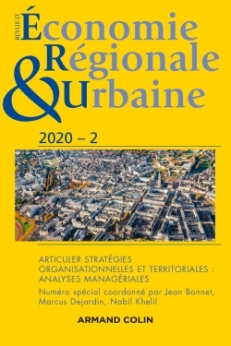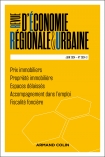
Revue d'économie régionale et urbaine (2/2020)
Pour acheter ce numéro, contactez-nous
Recevez les numéros de l'année en cours et accédez à l'intégralité des articles en ligne.
Selon l’Organisation Mondiale du Tourisme, la France est toujours la première destination touristique au monde avec près de 83 millions de visiteurs en 2016, cependant en termes de recettes elle ne se place qu’au quatrième rang derrière les États-Unis (premiers avec 205 milliards d’euros pour 77 millions de visiteurs). Un tel décalage s’explique notamment par un déficit de réactivité, de diversité, de flexibilité et de disponibilité dans l’offre réceptive sur des destinations locales autres que Paris, la Côte d’Azur et quelques grandes villes. Afin de mieux articuler une stratégie territoriale et organisationnelle avec une dimension managériale adaptée, cet article propose, en référence aux acteurs en charge de l’accueil, une nouvelle compétence organisationnelle d’assembleur à travers une gestion dynamique de l’offre touristique locale. Pour cela, il s’appuie sur le concept d’assemblage dynamique des chaînes logistiques (Pellegrin-Romeggio, 2011).
According to the World Tourism Organization, France is still the first tourist destination in the world with nearly 83 million visitors in 2016, however in terms of revenue it ranks only fourth behind the United States (first with 205 billion euros for 77 million visitors). Why is there such a gap between the number of visitors and the revenue generated by tourist activity in France? Several factors have been identified, such as resistance to change by certain corporations in the face of globalization, disintermediation and the Internet, the atomization of players, and a deficit in the marketing of the French destination on foreign issuing markets. But in general, it would seem that one of the main explanatory reasons for this situation is mainly due to the quality of the receptive offer in France. In fact, French tourism activity suffers from an underused receptive offer that can be greatly improved in terms of stakeholder coordination, responsiveness, flexibility, diversity and availability in general. This observation is mainly verified in the receptive offer on local destinations other than Paris, the French Riviera and some big cities. Faced with this critical situation, and in order to better articulate a territorial and organizational strategy with an adapted managerial dimension, this article proposes, with reference to the actors in charge of reception, a new organizational skill of assembler through dynamic management of the local tourist offer. To do this, it relies on the concept of dynamic assembly of logistics chains (Pellegrin-Romeggio, 2011). The general idea is to show the interest of understanding the tourism sector with a more dynamic and transversal vision rather than static and compartmentalized.

